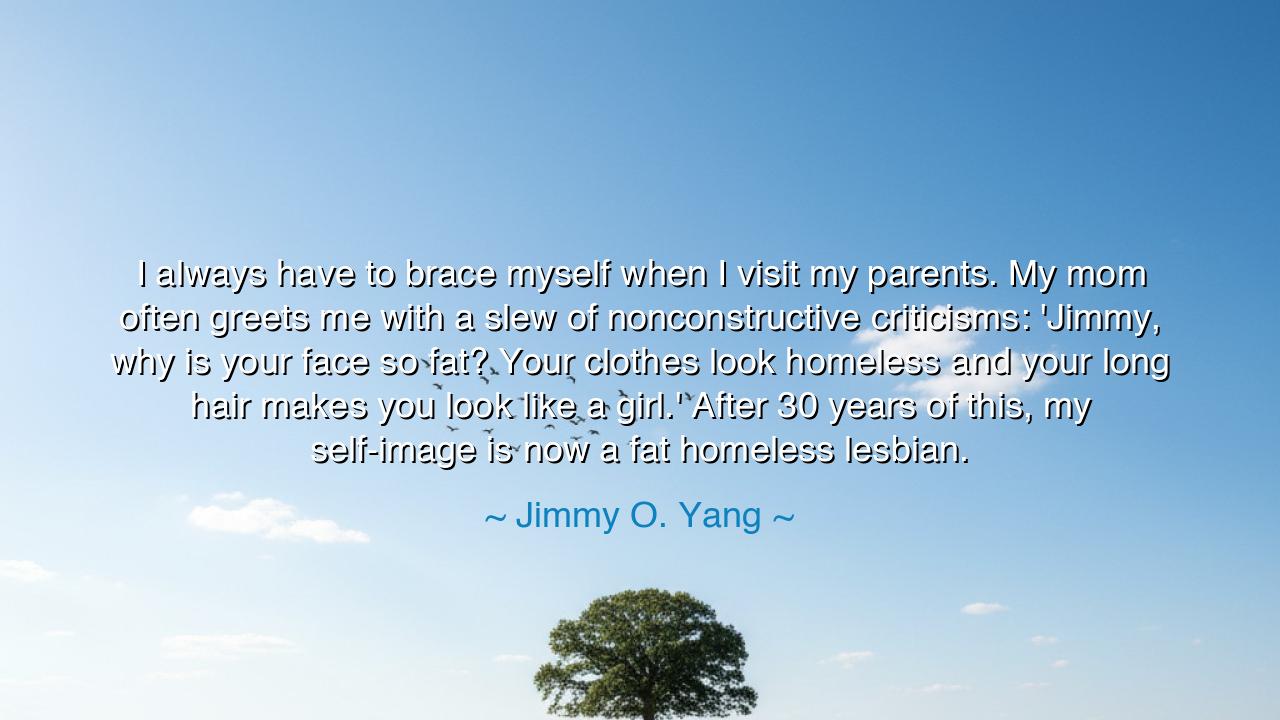
I always have to brace myself when I visit my parents. My mom
I always have to brace myself when I visit my parents. My mom often greets me with a slew of nonconstructive criticisms: 'Jimmy, why is your face so fat? Your clothes look homeless and your long hair makes you look like a girl.' After 30 years of this, my self-image is now a fat homeless lesbian.






There are wounds that are subtle, yet endure for decades, etched not by violence but by repeated words and judgments. Jimmy O. Yang, reflecting on his relationship with his mother, said, “I always have to brace myself when I visit my parents. My mom often greets me with a slew of nonconstructive criticisms: 'Jimmy, why is your face so fat? Your clothes look homeless and your long hair makes you look like a girl.' After 30 years of this, my self-image is now a fat homeless lesbian.” In these words lies the poignant truth that repeated verbal criticism, even if meant lightly or humorously, can shape identity, self-perception, and the inner life in profound ways.
Yang’s reflection illuminates the power of language and familial influence. From the ancients to modern times, scholars and sages have recognized that the words of those we love carry extraordinary weight. Aristotle taught that virtue is formed through habituation, and the same principle applies to emotional formation: persistent negative speech can cultivate self-doubt and distorted self-image. In Yang’s case, decades of critiques from his mother created an internal narrative that now governs his perception of himself.
The sadness in Yang’s words arises not merely from criticism itself, but from its nonconstructive nature. Constructive guidance, offered with care and intent to help, can inspire growth and resilience. Repetitive mockery or derision, however, erodes confidence and fosters feelings of inadequacy. Yang’s humorous exaggeration—calling himself “a fat homeless lesbian”—reveals both resilience and coping, but also underscores the deep impact of prolonged negative reinforcement. The heart, over time, internalizes the judgments repeated most often.
History offers examples of the long shadow cast by parental critique. Consider Vincent van Gogh, whose father’s stern and often harsh expectations contributed to feelings of inadequacy and emotional turmoil throughout his life. Though van Gogh achieved extraordinary creative brilliance, he wrestled with self-doubt shaped, in part, by parental influence. Yang’s experience mirrors this ancient reality: familial words can become the architecture of the psyche, shaping perception, self-esteem, and even identity over decades.
There is also a lesson in awareness and recognition. Yang’s ability to articulate the cumulative effect of his mother’s critiques demonstrates the first step toward self-understanding. Ancient Stoics, including Epictetus, taught that while we cannot always control the actions of others, we can cultivate awareness of their impact and choose how to respond internally. By recognizing the patterns that have shaped his self-image, Yang begins the process of disentangling his identity from decades of external criticism.
The humor he employs is also a form of resilience, a strategy that allows one to acknowledge pain without being consumed by it. Humor, in the manner of the ancient satirists and playwrights, becomes both shield and mirror: a means to survive emotional hardship while reflecting truth. Yang’s exaggeration communicates both the gravity of his experience and his capacity to confront it with levity, an ancient wisdom in itself: suffering may be acknowledged, yet it need not dictate the entirety of life.
From this reflection, a universal lesson emerges: words have immense power, and repeated criticism can shape identity in ways both subtle and profound. Awareness of this influence is the first step toward healing and self-determination. We cannot always control the words of others, but we can reframe, reinterpret, and actively cultivate a self-image rooted in truth, resilience, and self-compassion rather than repetition of hurtful commentary.
Thus, let Jimmy O. Yang’s words guide us: recognize the lasting influence of the voices around you, but do not allow them to define you entirely. Seek support, cultivate self-awareness, and practice self-compassion. Humor, reflection, and deliberate positive reinforcement can counter decades of unconstructive critique, allowing the heart to heal. In acknowledging both the pain and the resilience within, one can reclaim agency over self-image and transform enduring wounds into sources of strength and understanding.






AAdministratorAdministrator
Welcome, honored guests. Please leave a comment, we will respond soon